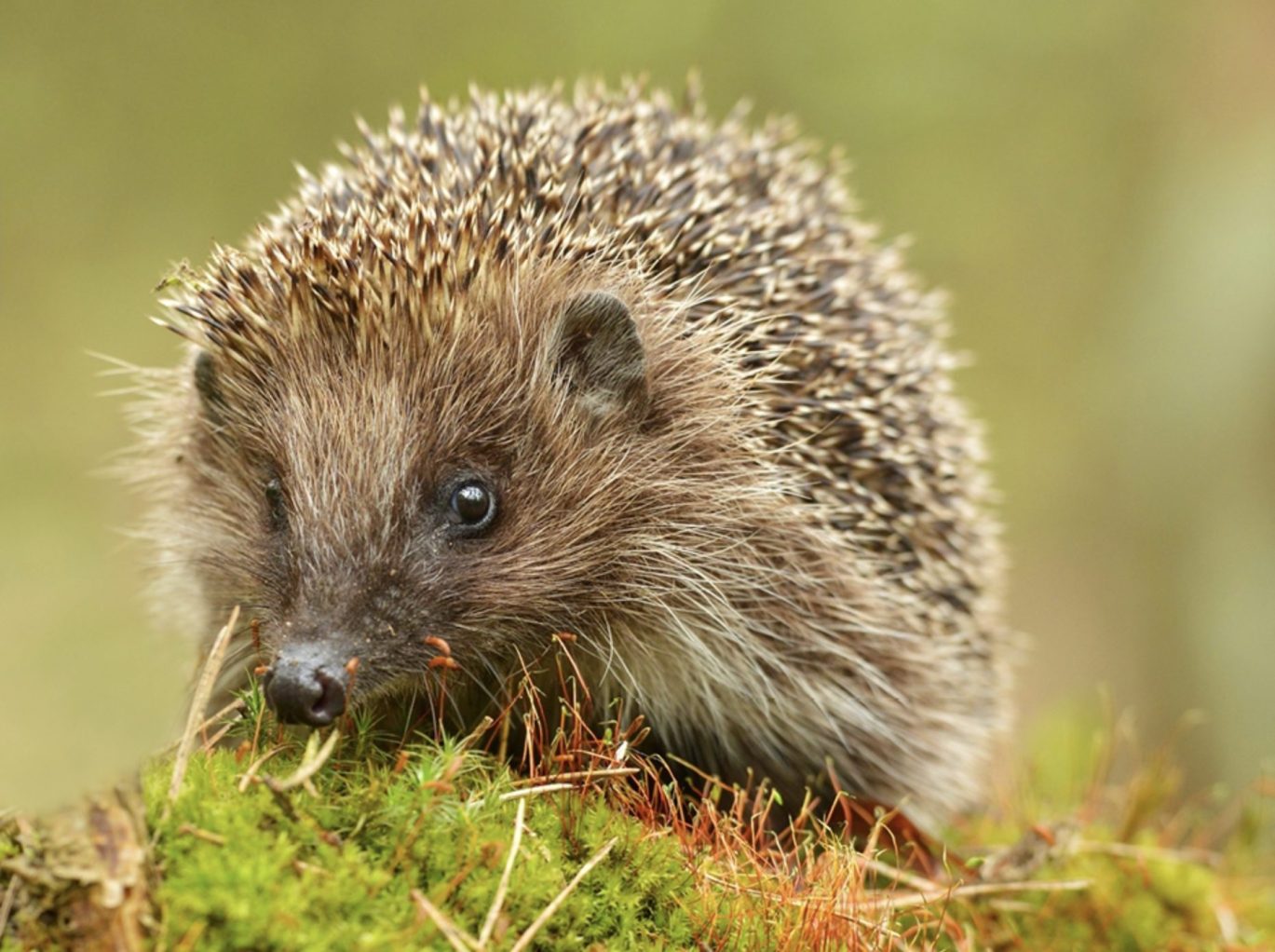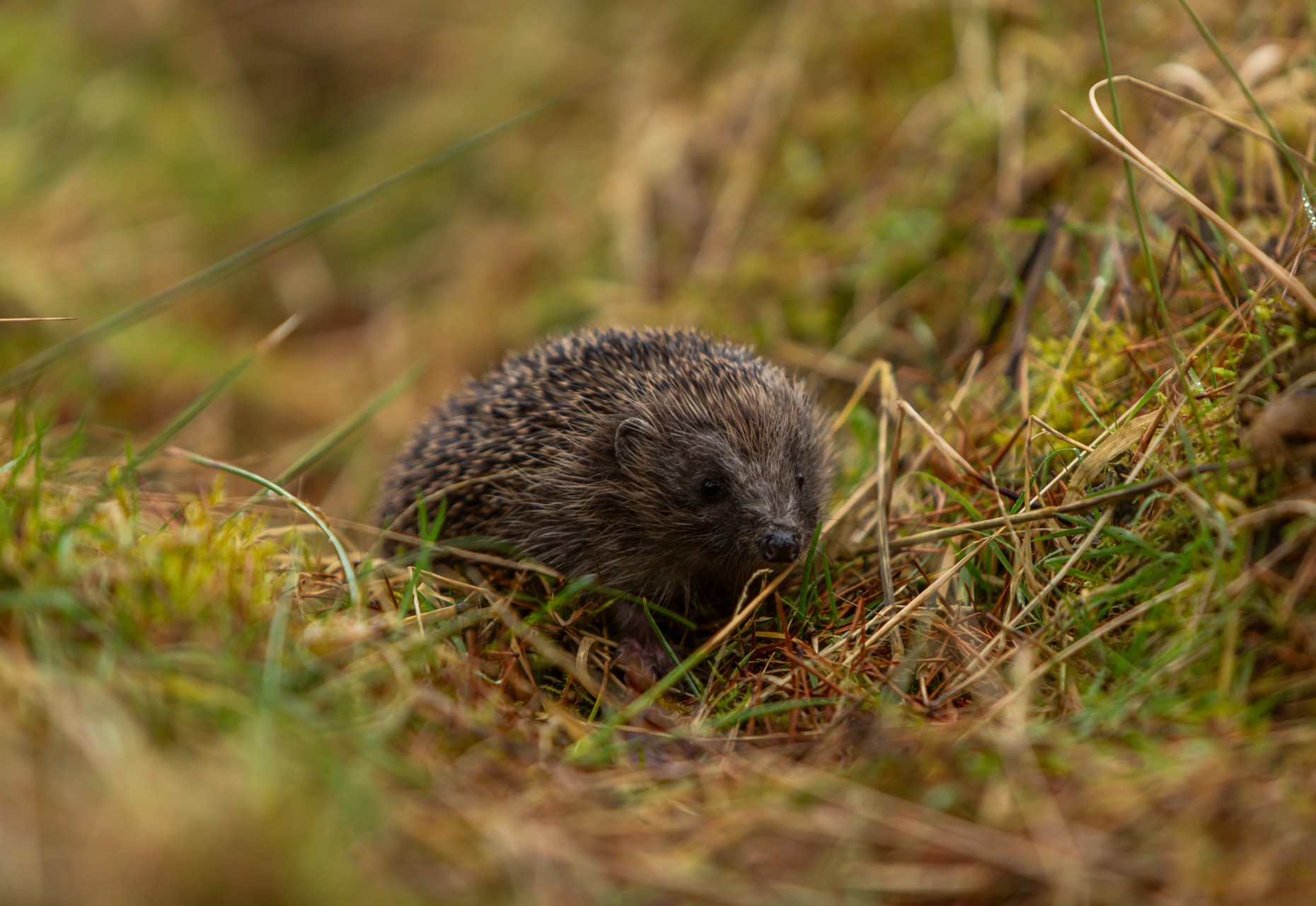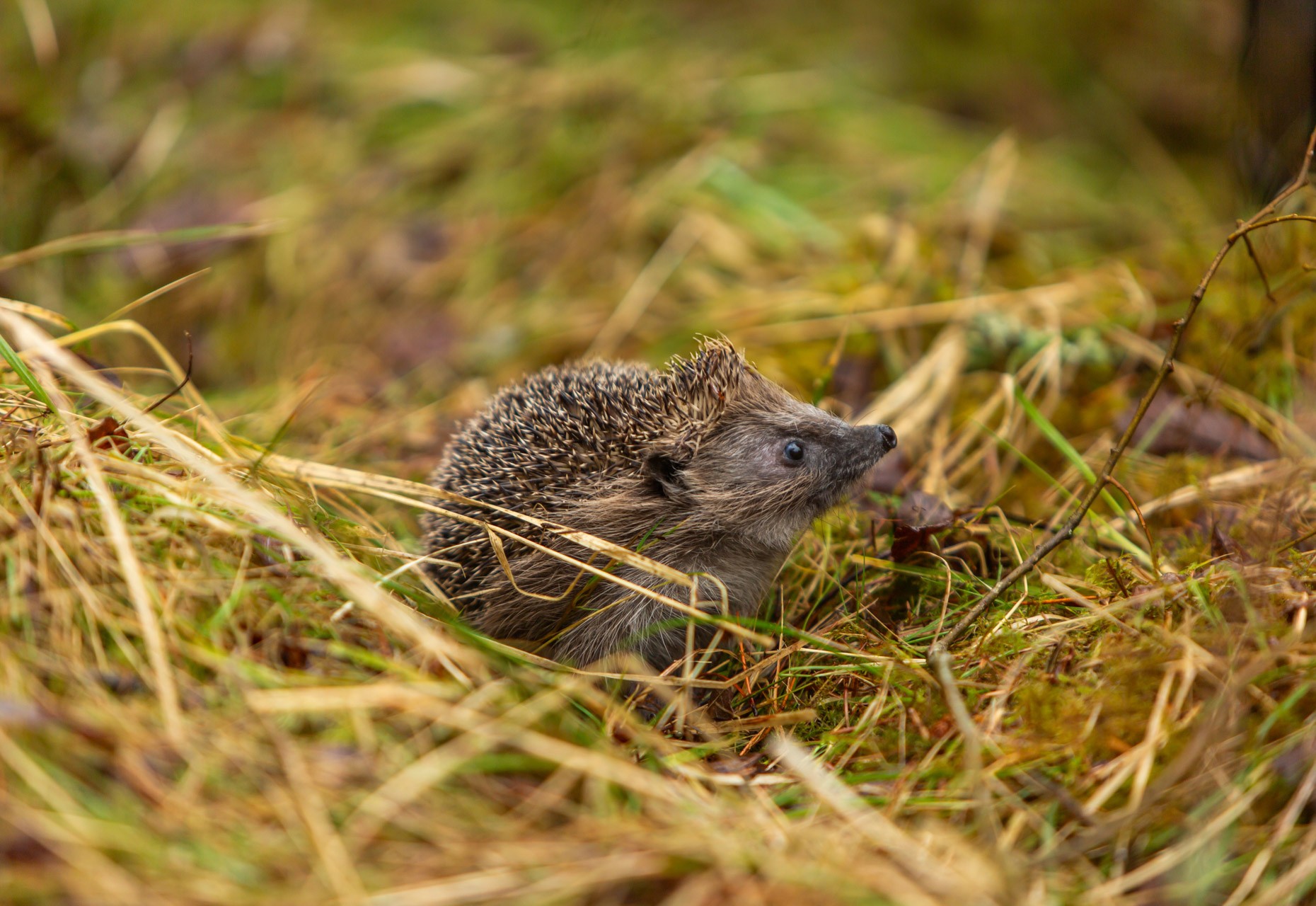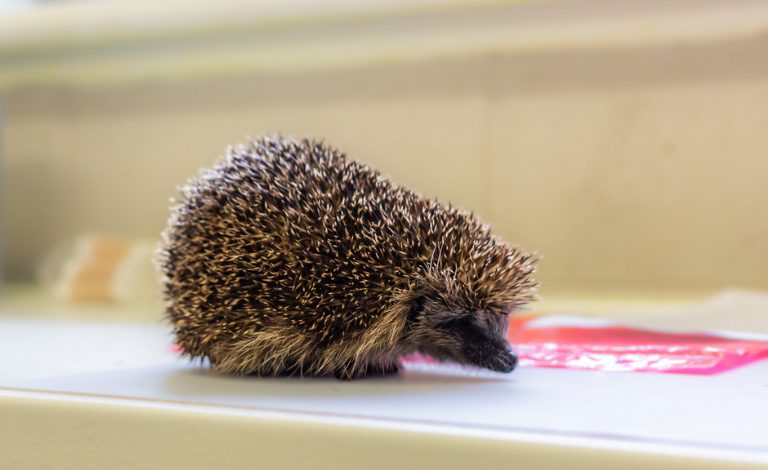
Hedgehog
A guide to hedgehogs: behaviour, garden visits, babies, and how to protect them
Typically found in gardens, parks, farmland and woods, hedgehogs thrive in areas with lots of bushes and hedges – the clue is in the name.
Hedgehogs are nocturnal creatures who hibernate during the colder winter months.
Where hedgehogs live
Hedgehogs are widespread across most of Scotland, except on some of the islands. They can live in a variety of habitats including woodland, fields and parks but our very own gardens can provide valuable habitat for them too.
During the day, hedgehogs nest under sheds, shrubs and bushes or in piles of leaves, twigs and logs. They have even been known to build their homes in bonfires and piles of rubbish!
What hedgehogs eat
An insect-rich lawn or flowerbed is like an all-you-can-eat buffet for hedgehogs! They particularly enjoy beetles, worms, caterpillars and other invertebrates.
Hedgehogs also eat fruits and berries, frogs and toads, bird eggs and anything else they can catch.
If you have hedgehogs living in or visiting your garden, you can leave out wet or dry cat and dog food. A shallow bowl of clean, fresh water can be a lifesaver when other sources of water are hard to get to.
Harmful to hedgehogs
Please read our list below of foods that are harmful to hedgehogs. If you feed hedgehogs in your garden, carrying on doing so right through the year is extremely helpful as many hedgehogs do not hibernate, or only hibernate for short periods. They particularly need extra help in the winter months when they are building up their fat reserves. Food specifically for hedgehogs can be purchased from pet shops, some supermarkets or online.
- Fish-based pet food is best avoided as it can cause digestive issues; has a strong odour which can show up in their faeces, affecting their scent in their enclosure; can cause allergies or sensitivities and low quality fish-based pet food can contain mercury and other additives which are not good for small animals like hedgehogs.
- Hedgehogs are lactose intolerant so you should never feed them milk or bread as they cannot digest it and it upsets their stomachs.
- Do not offer mealworms, sunflower seeds or peanuts as these can cause bone deficiencies and dental problems as they can get stuck on the roofs of their mouths.
Keep feeding and helping our prickly pals the right way.
When hoglets are born
Hedgehogs can have two litters in a year. Generally, the first litter will be born in around June then the second litter in late Summer or early Autumn, depending on the weather conditions.
On average, a female hedgehog will have four or five hoglets in a litter but could give birth to up to eight! The hoglets remain in the nest for their first four weeks, until they are ready to start learning how to forage for food. Hoglets can stay with their mother for six to eight weeks, at which point they will be fully weaned and ready to start foraging for themselves.
It’s normal for the mother hedgehog to leave her babies on their own whilst she rests or searches for food.
Hibernation
When temperatures become colder and the natural food supply gets scarcer, hedgehogs can go into hibernation to conserve energy. Hedgehogs begin preparing for hibernation around October. They spend the Autumn fattening up and finding a cosy spot to hibernate throughout the colder months.
That’s wild!
Not all hedgehogs will hibernate for the whole of Winter. If there is enough food available or air temperature is not too low then a hedgehog may choose not to hibernate.
Common problems hedgehogs face
Sick or injured hedgehogs
A hedgehog is likely to need our help if they:
- Have an obvious injury
- Are lying on their back
- Are walking with a limp or looking unsteady or wobbly on their feet
- Seem lethargic
- Are twitching or severe head shakes
- Have breathing difficulties or are panting
- Are walking around in a circle
- Looking thin and elongated rather than rounded
- Have a heavy parasite burden such as mites, ticks, ringworm, maggots or fly eggs
- Have been caught and injured by another animal
- Are tangled in litter
- Are surrounded by flies
If you have found a hedgehog that is injured or obviously unwell, please read our advice on the Wildlife Rescue pages. If you can’t find what you’re looking for, please call our Helpline on 03000 999 999, open from 8am to 8pm every day. If you do need to call us, please place a box over the hedgehog until our Officers arrive.
Out during the day
It’s unusual to see a hedgehog during daylight hours but it’s not unheard of. Mother hedgehogs may be out during the day gathering nesting materials as she prepares to give birth. However, if you see a hedgehog during the day and they also look sick or injured, please read our advice on the Wildlife Rescue pages. If you can’t find what you’re looking for, please call our Helpline on 03000 999 999, open from 8am to 8pm every day. If you do need to call us, please place a box over the hedgehog until our Officers arrive.
Disturbing nesting or hibernating hedgehogs
It’s common for hedgehog nests to be accidentally disturbed, for example, by dogs or when tidying up the garden.
If you disturb a nest and no hedgehogs were injured, cover the nest again and leave it be.
Always check for nesting hedgehogs when moving piles of logs or compost, before lighting bonfires and before carrying out any gardening work with strimmers or lawnmowers. It may not be intentional, but these actions are common causes of hedgehog injuries, especially during Spring.
Abandoned hoglets
If you accidentally disturb a hedgehog nest and there’s no sign of the mother, there’s no need to assume the hoglets have been abandoned. It’s normal for her to leave her babies alone whilst she rests or finds food. Cover the nest again and monitor from a distance to see if the mother reappears.
Do not attempt to hand-rear baby hedgehogs. They do best when raised by their own kind in the wild but if this is not possible, they require specialist round-the-clock care.
If you come across any of the following, please place a box over them to protect them and contact our helpline on 03000 999 999.:
- A hoglet in immediate danger.
- A hoglet near a dead adult.
- A baby hedgehog weighing less than 300g (about the size of an apple) without an adult nearby.
- A hoglet making a constant peeping noise without an adult nearby.
They could have been dropped by the mother hedgehog whilst relocating the nest. Likewise, the mother could have been scared away or something else has prevented her from returning.
Our helpline team may ask you to place them inside a box with a warm hot water bottle if possible, covering them with a towel or blanket and to keep them in a warm room.
Road traffic accidents
Sadly, many hedgehogs are hurt or killed in road traffic collisions every year. Click here for further advice.
You can report any hedgehog sighting here.
Tangled or stuck
Everyday obstacles can present massive challenges for hedgehogs and we have attended hundreds of jobs involving them getting into prickly situations over the years.
We’ve helped hedgehogs who have fallen into drains, become entangled in football netting or wedged themselves between gaps in fences. If you come across a hedgehog that can’t get free on their own, please contact our helpline on 03000 999 999.
Loss of natural habitat
With fewer suitable habitats like hedgerows or woodland areas, hedgehogs can struggle to find food and protection, leading to a decline in population numbers.
There are lots of ways to make your garden more welcoming to hedgehogs such as:
- Creating a ‘hedgehog hole’ at the bottom of your garden fence to allow hedgehogs to move from garden to garden with ease.
- Rewilding parts of your garden by constructing woodpiles and allowing areas to become overgrown. This will provide a natural source of food and shelter for local hedgehogs.
- Not clearing away natural materials like twigs, dead leaves, feathers and hay.
- Tidy away tennis nets, fishing materials and other things hedgehogs can get trapped in.
Avoid using pesticides in your garden as these will remove hedgehogs’ natural prey.

Together, we care for them
With your support, we can continue to care for Scotland’s animals every minute of every day. Your donation funds campaigns, research and projects to help give animals the life they deserve. Every £1 matters to all animals in our care.


